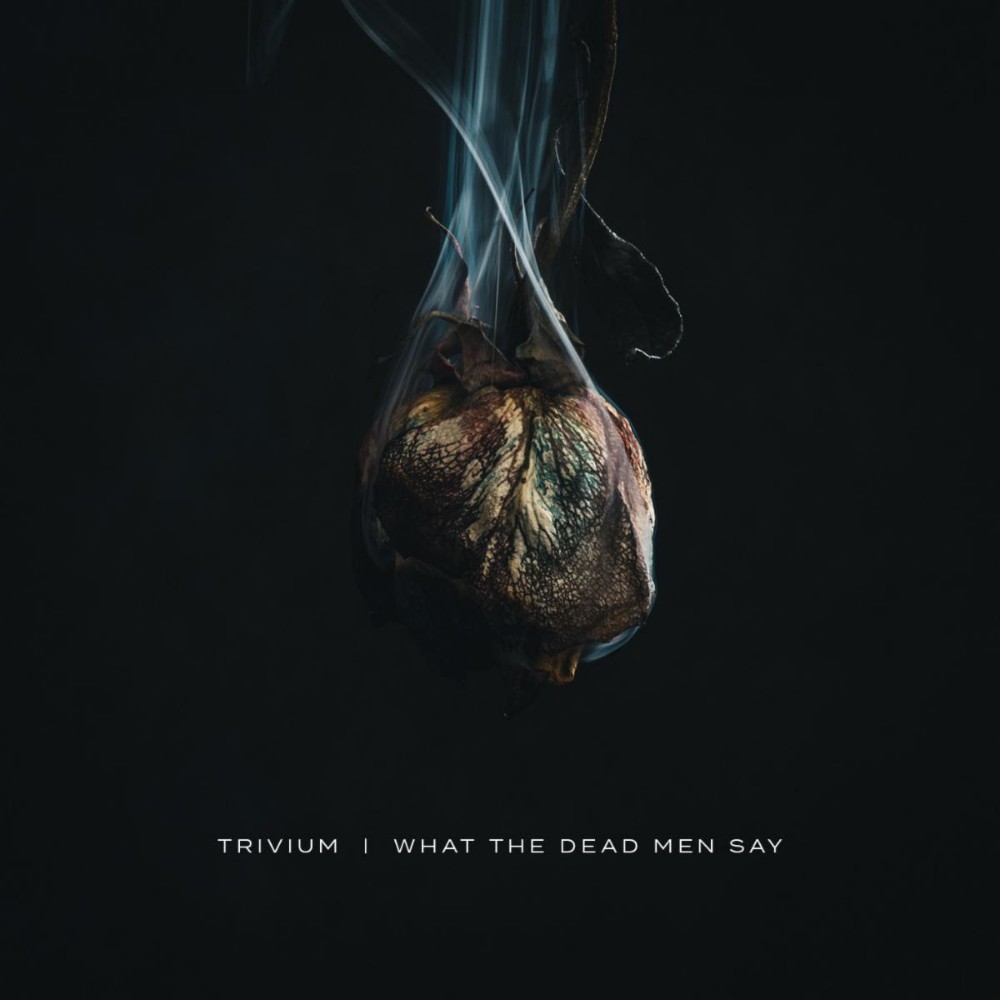
TRIVIUM – What The Dead Men Say
- by ER
- Posted on 08-05-2020
Just 17 years old (comparatively to Chuck Schuldiner when he formed Death) Heafy started both Capharnaum and Trivium, the latter with a "Trivium" demo (2003) and the subsequent debut album, "Ember To Inferno" (2003), which gave Trivium some acclaim, but it was the excellent, astonishingly mature "Ascendancy" (2005), which made them instantly as renowned as Killswitch Engage, God Forbid, Unearth or Lamb Of God, all of which influenced the direction of the album. Some critics called Trivium "the new Metallica" (circa 1986!) others compared Heafy to Schuldiner. Apparently these accolades went to their heads with Heafy reportedly vowing "wait ’til you hear our next album", referring to "The Crusade", released barely a year later. "Ascendancy" follow up was a more thrash-oriented but a deeply flawed affair, exposing Trivium’s inability to ride on the predecessor’s momentum, especially with Heafy almost abandoning the signature hardcore screams in favor of all-clean vocal approach. "The Crusade" was panned by critics and fans alike and Heafy wisely allowed 2 years before releasing "Shogun" (2008) which, while failing to match "Ascendancy" (a problem Trivium will have for years to come) showed a more mature and balanced effort than its immediate predecessor. Heafy’s screams were back but they sounded strained and forced, which turned out to be true when he lost his voice which precipitated a 3 year hiatus.
The following years Trivium would be struggling for identity and relevance on the fickle market. "In Waves" (2011) somewhat brought back the "Ascendancy" aggression but also increasingly revealed Heafy’s interest in alternative rock, which he was able to do after regaining and retraining his voice, but "Vengeance Falls" (2013) relied too much on producer David Michael Draiman (Disturbed) whereby Trivium often sounded like his day job. "Silence In The Snow" (2015), universally regarded as Trivium’s weakest effort, presented a sound stripped of all aggression, Heafy clearly searching for a new direction, while, admittedly constantly improving his vocal skills, and on "The Sin And The Sentence" (2017) Trivium finally got their bearings, returning to their core sound. The stage was set for Trivium to bring back the thunder of their past while introducing that new direction Heafy has been working on for the last 12 years.
"What The Dead Men Say", recorded as Matthew Heafy (vocals, guitars), Corey Beaulieu (guitars, backing vocals), Paolo Gregoletto (bass, backing vocals), Alex Bent (drums), leaves no doubt about where Trivium went with their sound, be it with the cover an amalgamate of colors from "Embers To Inferno" and "Ascendancy" Trivium’s two definitive records or how closely tracks 1-3 resemble those 2 albums, with the opener an intro somewhat related to the first song proper and tracks 2 and 3 in a similar vein as on "Ember…" and "Ascendancy". Now, while the first song, the title track, is an excellent ode to Trivium’s first two albums, its own intro recalls "Kirisute Gomen" (Shogun) and the death metal of "Dusk Dismantled" (In Waves) with its marching Morbid Angel-ic riffs, so you can see how aware Heafy is of the passing of time as well as Trivium’s highlights and strengths. Nowhere are both considerations more evident as on the album’s two perfect compositions which both display an impressive progressive edge not present since "Shogun". First, the video single "Catastrophist", with its excellent chorus, fantastic guitar and drumwork, also has that dying factor in metal: addictive fresh riffs, particularly that one around 4:05 and the subsequent "Human" Death "spider" riff reminding us how much Heafy loves Schuldiner’s style, the track twisting and turning, ebbing and flowing for a conclusion recalling Machine Head’s "A Farewell To Arms". Second, the Killswitch Engage-sque/All That Remains-y "Sickness Unto You" with its "I Am Hell" Machine Head-ian shouting verses and Chimaira-like breakdowns leave a taste of Heafy’s furious anger right in your mouth (as if he had spit on you), which is counterbalanced by the sweetness and sadness of the guitar melodies.
The rest of the songs are all excellent but none reach the two aforementioned’s highs and complexity, although they are very varied from song to song and each brings a different Trivium classic to mind. Take the Lamb Of God-ly "Amongst The Shadows And The Stones" reminiscent of "A Gunshot To The Head Of Trepidation" or the supermelodic and catchy Unearth-ly chorused "The Defiant" of similar vibe to "The Deceived", or the short simple "Scattering The Ashes" structurally resembling "Dying In Your Arms", "Bleeding Me" Metallica sounding "Bleed Unto Me", with excellent "walking" bass work which recalls "And Sadness Will Sear", or the most death metal song Trivium has ever penned, "Bending The Arc to Fear", which somewhat brings "Demon" to mind. Now, it must be said, unlike Testament on their new album, all the allusions are far from autoplagiarism, more like honoring the past with a view to the future.
After years of experimentation and endless search of direction Matt Heafy & Co. is back with an album highlighting their fantastic instrumental skills, but most importantly Trivium are, again, brilliant songwriters they were back in the first decade of the 21-st Century. When you add to this Matt’s incredible range (just listen to the end of "The Defiant") and hear how the screams sound confident and powerful and his cleans natural and sounding simply like Matt Heafy while able to express a variety of emotions, when you hear what he accomplished with his voice on this album, you’ll agree with my assessement. Trivium is back and "What The Dead Men Say" is the best thing since "Ascendancy". Now, gentlemen, please take this with a grain of salt THIS time.
